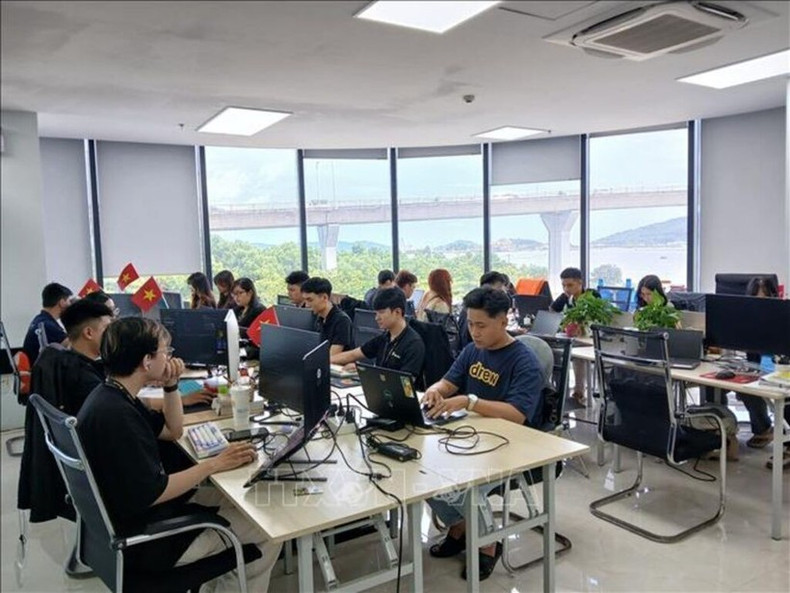Across Viet Nam - from Ha Noi and Ho Chi Minh City to Da Nang and beyond - incubation centres are breathing new life into the startup landscape. They nurture promising ideas and support diverse business models. Yet, despite their growing presence, these centres are not yet robust enough to serve as platforms for breakthrough success.
Cultivating an entrepreneurial culture
The spirit of innovation is flourishing, spreading from university lecture halls to local startup spaces. A standout example in Ha Noi is the FIIS Innovation and Incubation Centre at the Foreign Trade University. FIIS is recognised as a comprehensive ecosystem where ideas are cultivated and transformed into viable businesses.
Beyond supporting business formation, FIIS champions digital transformation, promotes environmentally sustainable models, and encourages social entrepreneurship aligned with circular and inclusive economic principles.
According to Associate Professor Dr Le Thi Thu Ha, Director of FIIS, the centre places education at its core - instilling entrepreneurial thinking in students and lecturers alike, and equipping young people with innovative mindsets from their university years. Numerous student-led projects have earned accolades in both domestic and international competitions, underscoring the potential of the entrepreneurial “seeds” nurtured within its walls.
Complementing FIIS are other notable models such as BK-Holdings at Ha Noi University of Science and Technology and the Centre for Knowledge Transfer and Startup Support at Viet Nam National University, Ha Noi. These institutions have become pillars of the capital’s startup movement, incubating successful ventures in educational technology, smart agriculture, and digital health. They have supported these startups in securing funding, expanding market reach, and even scaling internationally.
Zooming out, Viet Nam’s startup ecosystem is showing clear signs of progress. Ha Noi is actively promoting social enterprises tied to green transformation. Ho Chi Minh City, meanwhile, is home to approximately 2,200 startups and hundreds of investment funds, with ambitions to rank among the top 100 global startup ecosystems by 2030.
Da Nang has emerged as a regional leader with policies supporting 31 science and technology initiatives, incubating 189 projects, and establishing 83 innovative startup enterprises. In response to the demands of digital transformation, innovation centres, incubators, and co-working spaces are evolving into knowledge-sharing hubs. These hubs connect government, business, and community stakeholders, forming open networks that foster collaboration.
Viet Nam’s startup ecosystem is showing clear signs of progress and has the potential to thrive globally.
In the first few months of the year alone, Ho Chi Minh City approved 15 pre-incubation and 40 incubation projects—demonstrating a strong commitment to infrastructure investment and the cultivation of a new generation of startups. The recent launch of the Ho Chi Minh City Innovation Startup Centre further solidifies the city’s role as a regional leader in innovation and entrepreneurship.
Do Tien Thinh, Deputy Director of the National Innovation Centre (NIC), highlighted NIC’s role as a springboard for businesses—helping them grow from modest ideas to capital-raising ventures that expand internationally and generate employment. In agriculture, startups are leveraging the Internet of Things (IoT) and Artificial Intelligence (AI) to monitor crops, while in healthcare, platforms for remote diagnosis and treatment are gaining traction.
With a supportive ecosystem, Vietnamese startups have the potential to thrive globally. However, this promise hinges on improved policies and institutional frameworks to unlock greater breakthroughs.

Confronting systemic challenges
Despite their central role, incubation centres face persistent challenges. These include limited financial sustainability, a shortage of skilled human resources, and weak linkages between academic institutions and enterprises.
In Da Nang, local leaders have noted that innovation infrastructure remains fragmented, with insufficient coordination from major corporations and underdeveloped intermediary organisations. Although the city has invested 489 billion VND in a high-tech zone, software park, and innovation space, further government support is needed to drive meaningful progress.
Even in Ho Chi Minh City - Viet Nam’s scientific and technological heart - there is a shortage of high-quality talent in semiconductors, AI, and IoT. This has prompted increased collaboration with universities. One example is Le Duong Company, a technical enterprise specialising in IoT. The company has assembled a team of engineers focused on databases, encryption, and AI applications, producing smart monitoring solutions such as HSAFE and a labour safety monitoring system.
Yet, according to Director Le Dinh Tuyen, the most pressing challenge remains talent acquisition. Startups often struggle to recruit, train, and retain skilled personnel, particularly when constrained by limited capital and unable to offer competitive salaries.
In the tech sector, this scarcity of human resources poses a critical threat to survival. Other provinces also exhibit uneven development.
According to Director Le Dinh Tuyen, the most pressing challenge remains talent acquisition. Startups often struggle to recruit, train, and retain skilled personnel, particularly when constrained by limited capital and unable to offer competitive salaries.
Ha Tinh Province, for instance, lacks defined economic-technical standards for innovative startups, which are not yet codified in legal documents. The absence of venture investment mechanisms further hampers the nurturing of breakthrough ideas. Even established university models like BK-Holdings face expansion difficulties due to financial limitations, space constraints, and ambiguous legal frameworks.
NIC’s Deputy Director Do Tien Thinh noted that the number of innovation centres across Viet Nam remains low, with limited activities and resources. Even in Ha Noi, where conditions are relatively favourable, the number of official centres is modest. This underscores a broader issue: the support system is evolving far more slowly than the needs of Viet Nam’s vast enterprise base.
The bottlenecks extend beyond infrastructure. They are rooted in the businesses themselves and the wider support environment.
Tran Van Khai, Deputy Head of the National Assembly’s Committee for Science, Technology and Environment, observed that Vietnamese enterprises have yet to become the primary drivers of innovation. Investment in research and development is minimal, and connections with academic institutions remain fragile. Many small and medium-sized enterprises (SMEs) are eager to innovate but lack access to technology and expertise.
Meanwhile, research institutes often produce inventions that are difficult to commercialise. The absence of strong intermediary organisations to bridge these gaps has become a systemic obstacle across the innovation ecosystem.

International experience suggests that most inventions and patents are commercialised by enterprises. In contrast, Viet Nam’s research and development contributions are largely driven by foreign direct investment, with domestic private sectors under-investing.
Startups and SMEs also face a lack of technical infrastructure—from laboratories to prototyping workshops. Most support facilities are small-scale and resource-constrained, making it difficult for projects to test and refine their products.
Dr Pham Hong Quat, Director of the Department of Startup and Science and Technology Enterprises under the Ministry of Science and Technology, identified several key challenges: the relatively small number of entrepreneurs compared to the population, the scarcity of technology unicorns, and weak international expansion capabilities. Venture capital is trending downward, and a culture of innovation has yet to take deep root. The spirit of experimentation and risk-taking remains limited.
To address these issues, Dr Quat emphasised the urgent need for mechanisms that encourage domestic enterprises to engage more actively in innovation. Without such measures, Viet Nam risks falling short of its potential as a regional leader in digital entrepreneurship.
















